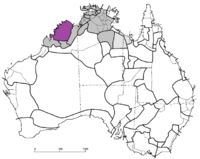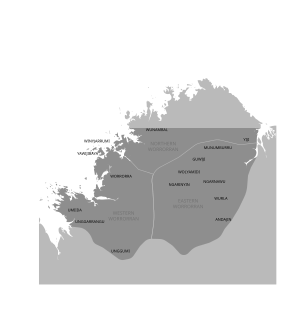Worrorra language facts for kids
Quick facts for kids Worrorra |
|
|---|---|

Worrorran languages (purple), among other non-Pama-Nyungan languages (grey)
|
|
| Region | Western Australia |
| Ethnicity | Worrorra, Unggumi, Yawijibaya, Unggarranggu, Umiida |
| Native speakers | 8 (2021 census) |
| Language family |
Wororan
|
| Dialects |
Worrorra
Unggumi
Yawidjibara
Windjarumi
Unggarrangu
Umiida
|
| AIATSIS | K17 Worrorra, K14, K49 |

Worrorran languages
|
|
Worrorra is an Australian Aboriginal language from northern Western Australia. It is also known as Worora or Western Worrorran. Sadly, very few people speak Worrorra today, making it an endangered language.
The Worrorra language is spoken by the Worrorra people. It is part of a larger group of languages called Worrorran languages. The other two languages in this group are Wunambal and Ngarinyin.
Contents
Worrorra Language Family
Worrorra is not just one language, but a group of very similar languages or dialects. Think of it like different ways of speaking the same main language. Experts have identified several of these related languages.
Main Worrorra Dialects
Some of the main dialects or closely related languages include:
- Worrorra proper (the main one)
- Unggumi
- Yawijibaya
- Unggarranggu
- Umiida
- Winyjarrumi (also spelled Winjarumi)
These languages are part of the Worrorran group, which is different from most other Aboriginal languages in Australia. Most other Aboriginal languages belong to the "Pama-Nyungan" family, but Worrorra is not part of that group.
The Umiida, Unggarrangu, Unggumi, and Yawijibaya peoples are groups who speak these related dialects.
There was once a clan name called Maialnga that was thought to be a Worrorra dialect. However, this could not be confirmed with people who speak the language.
Notable People
Elkin Umbagai was an important person who helped translate between English and the Worrorra language. This was very helpful for people to understand each other.
Worrorra Sounds
The Worrorra language has its own special sounds, just like English or any other language. These sounds are made using different parts of the mouth.
Consonant Sounds
Worrorra has many consonant sounds. Some are similar to English, while others are unique. For example, it has sounds made with the tongue between the teeth, and sounds made by curling the tongue back.
- When a nasal sound (like 'm' or 'n') comes before a stop sound (like 'p' or 't'), it often blends together.
- The 'r' sound can be rolled or flapped, like in Spanish.
- Sometimes, the 'j' sound at the beginning of a word can sound a bit like a 'sh' sound.
Vowel Sounds
Worrorra has a few main vowel sounds, similar to the 'a', 'e', 'i', 'o', 'u' sounds in English.
- Some vowel sounds can be held for a longer time, making them "long vowels."
- Sometimes, a very short, quiet vowel sound is added between two consonant sounds to make them easier to say.
Worrorra Sign Language
The Worrorra people also had a special way of communicating using signs. This was a signed form of their language. It was used when people needed to talk to family members they had a special, respectful relationship with, where speaking aloud might not be allowed. It's not fully clear how developed this sign language was compared to other Australian Aboriginal sign languages.
 | Lonnie Johnson |
 | Granville Woods |
 | Lewis Howard Latimer |
 | James West |

